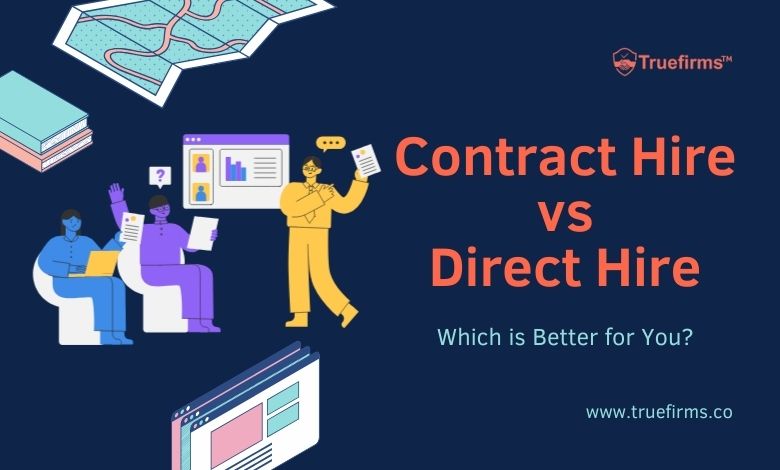Contract Hire vs Direct Hire: Which is Better for You?

Businesses are often forced to choose between hiring direct hires and hiring contracts when growing their staff or creating a team. According to the requirements, financial constraints, and long-term objectives of the business, each strategy offers advantages and considerations of its own. To help you choose the right course of action for the reasons you have, let’s examine the subtle differences between contract hiring and direct employment.
Contract Hire
This hiring model involves bringing in employees or workers for a specified period to fulfill a particular project or task. Contract hires are typically employed through an agency or directly by the company on a temporary basis. These arrangements are often project-based and can vary in duration, from a few weeks to several months or even years.
Direct Hire
Direct hiring, which is another name for “permanent hiring,” describes the conventional method of recruiting when a candidate is chosen and hired directly by the business to work full-time. Direct hires become integral members of the organization and are expected to contribute to the company’s long-term objectives and culture.
Advantages of Contract Hire
Contract hiring offers several advantages that make it an appealing option for businesses:
• Flexibility: Contract hires can be swiftly engaged or released based on project demands, offering businesses flexibility in managing their workforce.
• Specialized Skills: Companies can tap into specific skill sets for short-term needs without committing to long-term employment.
• Cost Savings: Contract hires may be cost-effective for short-term projects, as companies can avoid expenses associated with full-time employment like benefits and severance.
Disadvantages of Contract Hire
However, contract hiring also has its drawbacks:
• Limited Loyalty: Contract workers may lack the same commitment and loyalty as permanent employees, potentially affecting team cohesion and morale.
• Skill Retention: It’s possible that contract staff’ specialized abilities may leave the company after the contract expires.
• Continuous Recruitment: Companies relying heavily on contract hires may face ongoing recruitment efforts, which can be time-consuming and costly.
Advantages of Direct Hire
Direct hiring offers distinct advantages that cater to long-term staffing needs:
• Employee Commitment: Direct hires are more likely to be invested in the company’s success and culture, fostering stronger team bonds.
• Skill Development: Permanent employees have the opportunity for ongoing skill development and career growth within the organization.
• Stability: Direct hires contribute to the stability and continuity of the workforce, supporting long-term business objectives.
Disadvantages of Direct Hire
Direct hiring isn’t without its challenges:
• Upfront Costs: Hiring and onboarding direct employees can be more expensive initially due to recruitment and training expenditures.
• Long-Term Commitment: Committing to full-time employees requires a longer-term investment, which may be less flexible in responding to fluctuating business demands.
• Termination Complexity: Dismissing permanent employees can be legally and emotionally challenging, particularly in downsizing scenarios.
Contract-to-Hire vs Direct Hire
It’s essential to differentiate between contract-to-hire and direct hire.
• Contract-to-Hire: This arrangement allows employers to assess a worker’s fit within the organization before extending a permanent job offer. It serves as a trial period for both parties.
• Direct Hire: In direct hiring, the employment is permanent from the outset, with the intention of long-term employment.
Conclusion
The choice between direct hiring and contract hiring ultimately comes down to staffing strategy, project schedules, and the unique demands of your business. In situations where specialized talents are needed for immediate initiatives, contract employment may be the best option. Conversely, direct hiring offers consistency and continuity if your goal is to assemble an effective group with an eye toward the future.
To make an educated choice, think about weighing the advantages and disadvantages listed below against your company’s objectives. Regardless of the route you take, the objective is to put together a skilled and dedicated team that will drive your company into success.











